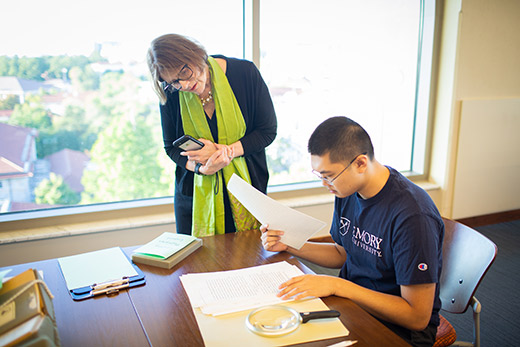
Student Jeffrey Gao and associate professor of history Judith Miller. From Emory Photo/Video.
Associate Professor Judith A. Miller is teaching a first-year seminar this spring titled “Fake News.” The Emory News Center’s Maureen McGavin describes the class as investigating “examples of fake news, conspiracy theories, hoaxes, biased stories and wrongful convictions, in the U.S. and in other countries, as well as discussions of how the falsehoods took hold and were eventually debunked.” Read the Emory News Center’s profile of the course, “‘Fake News’ class helps students learn to research and identify false information,” in addition to the full course description below.
“Fake news, hoaxes, “truthiness,” lies, spin rooms, bots, leaks, deniers, and propaganda: These phenomena have shaken the world in the recent years. Fake news has become important part of our daily political culture, whether in the United States or elsewhere around the globe. Elections and public policy have been influenced by them. Our course will delve into several historical cases of hoaxes, history “deniers,” and media exploitation before turning to the recent past and even daily events in the US and elsewhere. What dynamics do those examples reveal that can illuminate the contemporary world? Then we will explore the place of social media such as Twitter and Facebook, as well as darker parts of the web, in purveying both accurate and false information. For instance, how do “fake news” authors use language, music, and images to make their ideas more persuasive? How has technology increased the power of “fake news”? Why have certain kinds of societies been more or less vulnerable to propaganda? How have courts understood the principles of “free expression,” “burden of proof,” and a “free press”? How have politicians and journalists contributed to and struggled with the recent intensifying “fake news” phenomenon? We will work closely with Woodruff librarians as we evaluate evidence: How do historians weigh claims and sources? Are there even clear red flags in our media-saturated world? How can historical examples help us sort out these questions? Each student will develop a case study of an incident–understood broadly, anything from political propaganda anywhere in the world, to allegations of wrongful conviction or sexual assault, to history deniers, as just a few examples–that takes up these issues.”
